NCERT Solutions for Class 9 English Main Course Book Unit 6 Children Chapter 3 Children and Computers are part of NCERT Solutions for Class 9 English. Here we have given NCERT Solutions for Class 9 English Main Course Book Unit 6 Children Chapter 3 Children and Computers.
| Board | CBSE |
| Textbook | NCERT |
| Class | Class 9 |
| Subject | English Main Course Book |
| Chapter | Unit 6 Chapter 3 |
| Chapter Name | Children and Computers |
| Category | NCERT Solutions |
CBSE Class 9 English Main Course Book Unit 6 Children Chapter 3 Children and Computers
Question 1.
Complete the following information about yourself SURVEY OM THE USE OF COMPUTERS.
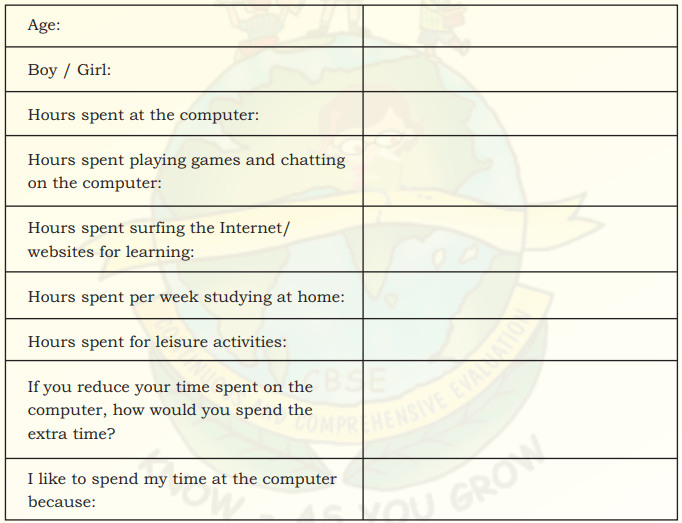
Answer :
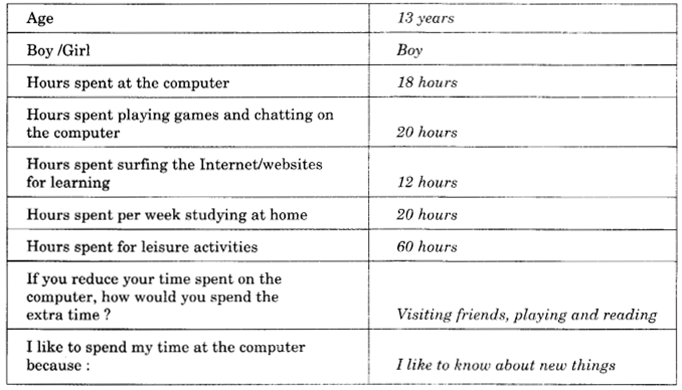
Question 2.
Divide yourselves into groups and collect information on the use of computers from five students each of classes VI, IX and XI. Compile and summarise your answers to the questions above in the following table.
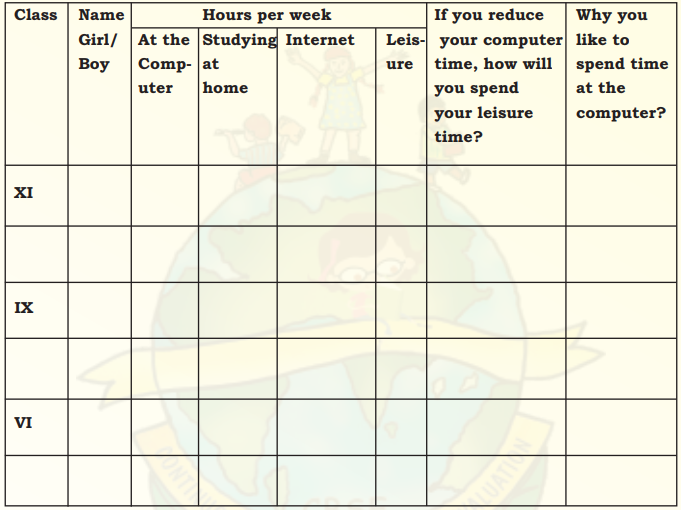
Answer :
Students to exchange information as desired and asked under the supervision or guidance of the class teacher.
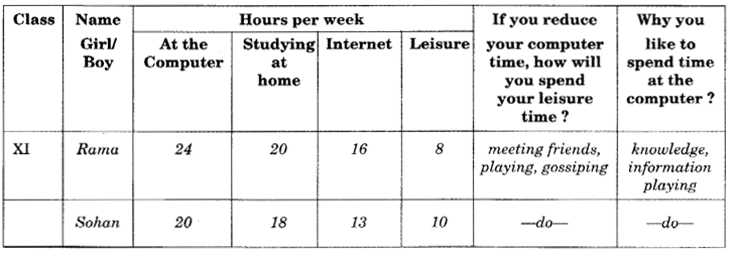

Question 3.
Exchange information with another group and record it. Then in groups of four discuss the results of the following :
- Do boys and girls spend the same amount of time at the computer ?
- Do their tastes and preferences change as they grow older ?
- Are the number of hours spent at the computer/studying at home/leisure/internet different between boys and girls ?
- Do the number of hours per week spent at the computer/studying at home/internet/ leisure activities change as students get older ?
Answer :
Students to attempt on their own under the guidance of their class teacher.
Question 4.
Now listen to two speakers debating on the topic, ‘Education of the Girl Child is a Burden’.

Answer :
Speaker for the motion
Respected Chairperson, Honorable judges, members of staff and friends, I stand here to express my views for the motion: Education of the girl child is a burden.I would like to state that the education of the girl child is indeed a burden. In a poor family the education of the girl child comes outside the purview of the budget. When the resources are limited, the priority areas have to be fixed. In a poor family feeding all the members, clothing them and looking after their health is of primary concern to the head of the family. The rest of the resources of the family should be devoted to the education of the boys in the family. Later on if the boy is going to be the head of the family and will be the bread winner, he should be properly educated and groomed to take on the mantle. So, Sir, I feel that in such a case the education of the girl child will be a burden. Even if a girl child is educated and given the right kind of grooming, one day or the other, she might leave the family nest and get married.
So in that case, why should the family divert its precious resources in that direction? I feel that those resources should also be utilized for the boys so that they can come up in their life. Further, when the girl child stays at home she can look after and manage the house and learn to do all the household chores. If the girl starts going out of the house to attend school, college etc., who will do all the household work? Her duty later on in life is to look after the family and take care of the children. If she does not do that and is away from home for long periods, that will be an additional burden on the house. So I feel that by
educating the girl child the family will be inviting trouble and it should utilize its precious resources as economically as possible I support the motion that the education of the girl child is a burden.
Speaker against the motion
Respected Chairperson, honourable judges, members of staff and friends. My knowledgeable opponent is of the opinion that the education of the girl child of the family is a burden. I strongly oppose the motion. May I ask how can educating the girl child, who is an equal partner in sharing the responsibilities and duties, be a burden? She will be sharing the burden and reducing its impact by supplementing the resources rather than reducing them. Let me draw your attention to the fact that such notions are a thing of the past. If the boys and girls are to be treated as equals, then both of them have right to education. If resources can be spared for the boy’s education then they have to be spared for the education of the girl too, as we have seen that educating a child is not a burden, but an investment. So the family has to devise means, squeeze its budget and make space for the education of the girl child, because the future of the family depends upon the growth and education of the girl child.
So I oppose this motion and I feel that it is regressive. It is a well established fact that education is a kind of investment. By educating the girl child the family is making a sound financial investment. When the girl child is educated, she will reduce the financial burden of her father and later her husband. So how can my friends say that it is a burden? My knowledgeable friend has stated that by providing for the education of the girl child a family diverts its precious resources. But I would like to inform my friend that at the school level and even at higher levels the government institutes are providing free education to the girl child and concessions are given. So in this case the family only has to spend on her books and clothes etc.
Moreover, my friend has stated that household work is the duty of the girl child. It is such traditionally ascribed gender roles that have led to gender inequality in society. Data shows that it is uneducated mothers who in greater percentage accept that their daughters shoulder all the household related work. It is education that will bring about a change in attitude of people towards stereotypical gender roles and result in greater equality. My friend, the community’s development is incomplete without the education of girls. Indeed it is rightly said: ‘If you educate a man, you educate an individual. If you educate a woman, you educate a nation.’
Thank you.
Question 5.
Did you notice the phrases used by debaters to emphasise/negate certain points? Given below are certain expressions that might be used by debaters.
- I’d like to raise a/the question / argue …
- In my opinion …
- Nothing could be more illogical than …
- I feel very strongly that …
- I would like to draw attention to …
- I fail to understand …
- I think you are being unreasonable in suggesting …
- I submit that …
- My first / next / final argument against / in favour of …
- I support the motion that …
- My knowledgeable opponent has submitted that …
- May I ask …
- I strongly oppose / support the view that …
- On the contrary …
- It is unrealistic to say that …
- I disagree …
- I firmly reject …
- I wholeheartedly oppose / support …
Answer :
Students to study the information given. (No question asked)
Question 6.
Study the following graph and the accompanying report.
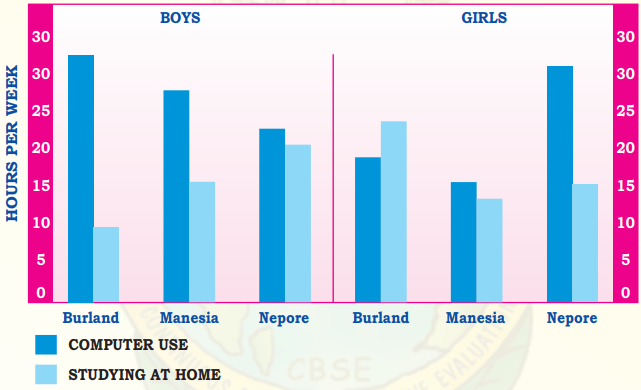
Our study of the time spent by students at the computer and studying at home in three countries has revealed some interesting facts. First, the majority of boys and girls in the age groups of 14-16 in these countries spend more time at the computer than studying at home. Children in these countries spend an average of 20-30 hours per week in comparison to 10-15 hours of studying at home. The only exception is Burland where girls spend more time studying at home than at the computer. Secondly it is evident that in all three countries, time spent at the computer is having a serious impact on the number of hours spent studying at home. In fact, the greater the number of hours spent at the computer, the fewer number of hours are spent studying. For example boys in Burland spend an average of 32 hours at the computer while they spend about 8 hours studying at home.
Answer :
Students to study the information given (No question asked).
Question 7.
Now prepare a graph based on the students’ response to the survey you conducted in Question 2. Then write a report for the newspaper taking the help of Question 5, Question 3 and Question 6. You may follow this pattern:
Paragraph 1 : A suitable introduction as in Chapter 2 Question 4
Paragraph 2 : Hours per week spent on different activities – classes VI, IX and XI compared.
Paragraph 3 : How extra time would be used – Classes VI, IX and XI compared.
Paragraph 4 : Boys and girls compared – Classes VI, IX and XI.
To express proportion :
Most …
Many …
The majority of …
A large number of …
A small number of …
Very few …
Only a few …
To express frequency :
Most of the time …
Frequently …
Occasionally …
Often …
At times …
To express comparison and contrast :
… compared with …
On the other hand, …
In contrast, …
By comparison, …
… however, …
… in comparison with …
Answer :
Students to prepare a graph as asked for here and to write a report taking the help of Chapter 2 Question 5, Question 3 and Question 6 etc.
A sample graph is given below :

A Report
A survey on the time spent by students of classes VI, IX and XI at the computer, studying at home and leisure time was conducted recently. It revealed some startling facts.
First, the students of classes IX and VI spend almost equal time at the computer ranging from 15-20 hours a week. However, students of class XI spend 20-24 hours at it. Regarding studying at home students of classes XI and IX devote equal hours ranging from 18-20 hours to it. It is less by 3 hours in the case of students of class VI.
Secondly, time spent on Internet varies from one class to the other. It was found that students of class IX spend more time on it as compared to those of classes XI and VI.
It is evident that time spent at the computer and Internet is having a serious impact on the number of hours spent studying at home. In fact, the greater the number of hours spent at the computer and the Internet, the fewer number of hours are spent on studying. Students of class XI have less number of hours for leisure as compared to the hours of leisure had by students of classes IX and VI. It is 8-10 hours in the case of students of class XI, 14-15 hours in the case of students of IX and 20-24 hours in the case of students of VI.
Question 8.
This is a meeting of the school’s Parent-Teacher Association.Some student representatives have also been invited to participate to discuss the role that Information Technology / Computers play in the growth and development of children.
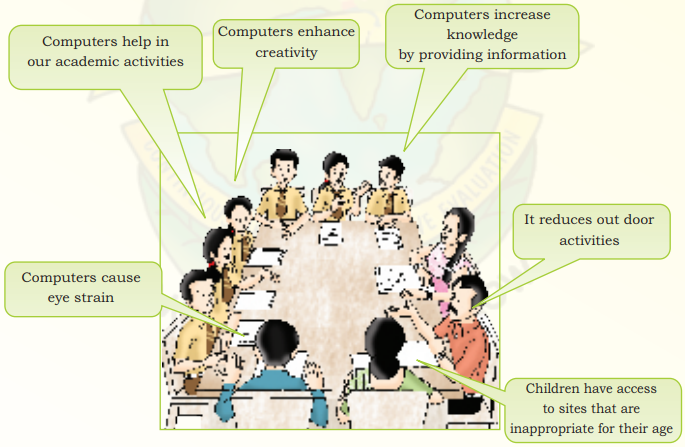
Answer :
Students to read the information given.
Question 9.
You will now hold an actual class debate on the topic ‘Computers and Children : A Boon or a Bane’.
In groups of four decide whether your group is FOR or AGAINST the motion. Then draft your debate. Each member of the group must participate in the written as well as the spoken matter. The spoken matter can be divided thus
- One introduces the topic
- One discusses points favouring the motion
- One argues the opponent’s points
- One concludes
Answer :
Students to hold the actual debate on the topic. A sample debate is given below.
Computers and Children : A Boon or a Bane
(For the Motion : A Boon)
Respected chairperson, Honourable Judges, members of staff and students. I stand here to express my views for the motion, that is computers are a boon for the children. I would say that computers have really proved a boon for them because they have brought the entire information at their doorstep. You switch on your computer and just with a flick of the key you have all the knowledge of the world on your computer screen. If we enumerate the advantages of computers we’ll find little space to put all of them on the paper. For instance, computers help the children in their academic activities. They satisfy the curiosity of the children. In doing so, they increase their knowledge by providing every sort of information. It is a fact, you’ll agree with me, that visual aspect of knowledge gets embedded almost permanently on the children’s minds.So computers provide the children knowledge that becomes a part of their memory.
You’ll kindly see that children tend to play and gossip. In the area of playing too computers don’t lag behind. Children play all sorts of games – intellectual and/or otherwise, on their computers. We have seen that children play video games and thus entertain themselves through these. Thus computers provide all kinds of knowledge, entertainment, recreation etc. From these points I would definitely say that computers have proved a boon for the children and in their mental growth.
Thank you very much.
Computers and Children
(Against the motion : A Bane)
Respected Chairperson, Honourable Judges, members of staff and students. I stand before you to speak against the motion : Computers are a bane for the children. My knowledgeable friend has pointed out some positive points which justify the desirability of computers. You’ll agree with me if I say that computers have become an integral part of our lives. There is no human activity which doesn’t involve the usage of computers. I, too, agree with my friend on this side of the computers. But my knowledgeable Mend has overlooked the other side of computers, that is,computers are a bane for them. First of all, computers cause eye strain. You have seen that small children have started wearing spectacles as constant looking at computers’ screens harm their eyes. Secondly, computers reduce the children’s outdoor activities thus impairing their health.
We see obesity in children who are soon growing to be couch potatoes. Thirdly, children have access to sites that are inappropriate for their age. There are many undesirable sites which are very attractive to them. But they corrupt their innocent minds and drift them from our culture and its values. This sort of access damages their thinking and affects the whole personality. It opens gates to various cultures that are unsuitable for our culture. Children get exposed to certain websites which are immoral seeing their ages and minds. I would say that parents should supervise their children while they are using their computers. This way we shall find the computers useful. But if unchecked, they are a bane for them.
Thank you very much.
We hope the NCERT Solutions for Class 9 English Main Course Book Unit 6 Children Chapter 3 Children and Computers help you. If you have any query regarding NCERT Solutions for Class 9 English Main Course Book Unit 6 Children Chapter 3 Children and Computers, drop a comment below and we will get back to you at the earliest.